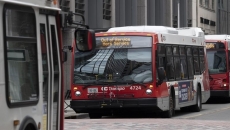VANCOUVER - The British Columbia government says a $132-million program that adds staff, beds and services across the province seeks to help people who require substance-use treatment and recovery care.
Sheila Malcolmson, the province's minister of mental health and addictions, says the program will include 65 new or improved services, about 130 more staff and 195 new substance-use treatment beds.
She says some of the new initiatives include a sobering centre in Prince George, an addiction medicine treatment team at Burnaby Hospital and withdrawal services at several locations in B.C.'s Interior.
Dr. Patricia Daly, Vancouver Coastal Health's chief medical health officer, says the spending will broaden and strengthen care services for people who are seeking substance use disorder treatment.
Malcolmson says the program will also provide addiction treatment beds to support women from the Interior and Island health regions.
It will extend an Indigenous-led alcohol treatment and recovery program in Port Hardy as well.
"Big system-level change does not happen overnight. But month over month, we are moving closer to our goal," Malcolmson told a news conference at Vancouver's St. Paul's Hospital. "Today is a milestone along that journey. Up to now we have been patching holes in that road as we drove over them."






